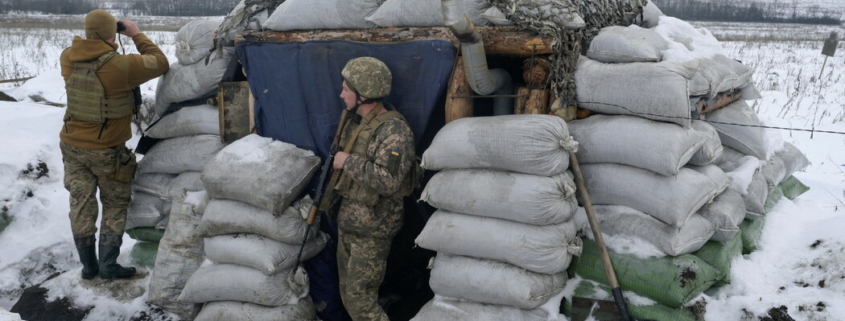Ukraine dismantles disinformation botnet; UK warns of Russian invasion risk.
The Minsk Accords, under negotiation since shortly after Russia’s 2014 seizure of Crimea, continue to serve as the centerpiece of Russian diplomacy with respect to its claims against Ukraine. The AP has a useful review of their history and implications. In general, the Accords give support to Russian ambitions for nominally separatist Ukrainian provinces to be treated as autonomous regions, their ultimate fate to be determined by plebiscite. Negotiations between Russia, Ukraine, and NATO have continued, slowly, and the Telegraph sees the slow-rolling as entirely to Russia’s advantage, with its opponents likely to concede incremental gains over the course of protracted diplomatic engagement. And amid concerns about a Russian threat to its electrical supply system, Ukraine has continued to prepare its separation from the Russian power grid. Such separation would be a contingency to be exercised upon invasion.
Ukraine’s SBU takes down Lviv bot-farms.
The SBU announced its liquidation of two bot farms in the Ukrainian city of Lviv, which the SBU says were operating under Russian direction. Three arrests were made. Two of the suspects are accused of lending their apartments to bot-farming; the third maintained the equipment and software. The two farms controlled some 18,000 bots, and were largely engaged in disruptive influence operations, spreading rumors of bombings and the placement of “mines” in critical infrastructure. The Record describes the bot-farm’s goal as “spreading panic.” The bomb threats may be connected to a wave of such threats Euromaidan reported near the end of January. The SBU at that time characterized the campaign as a preparatory operation in a Russian hybrid war.
Moscú habla español.
Foreign Policy cites a study by Omelas that found Russian-run Spanish language outlets outperforming their American counterparts in pushing a narrative on the crisis in Ukraine. The Russian media outpace US services by three-to-one as measured by audience engagement in the Spanish-speaking Western Hemisphere.
The UK issues a warning.
British Prime Minister Boris Johnson has been unusually direct at mid-week about the risks and consequences of any further Russian invasion of Ukraine….



